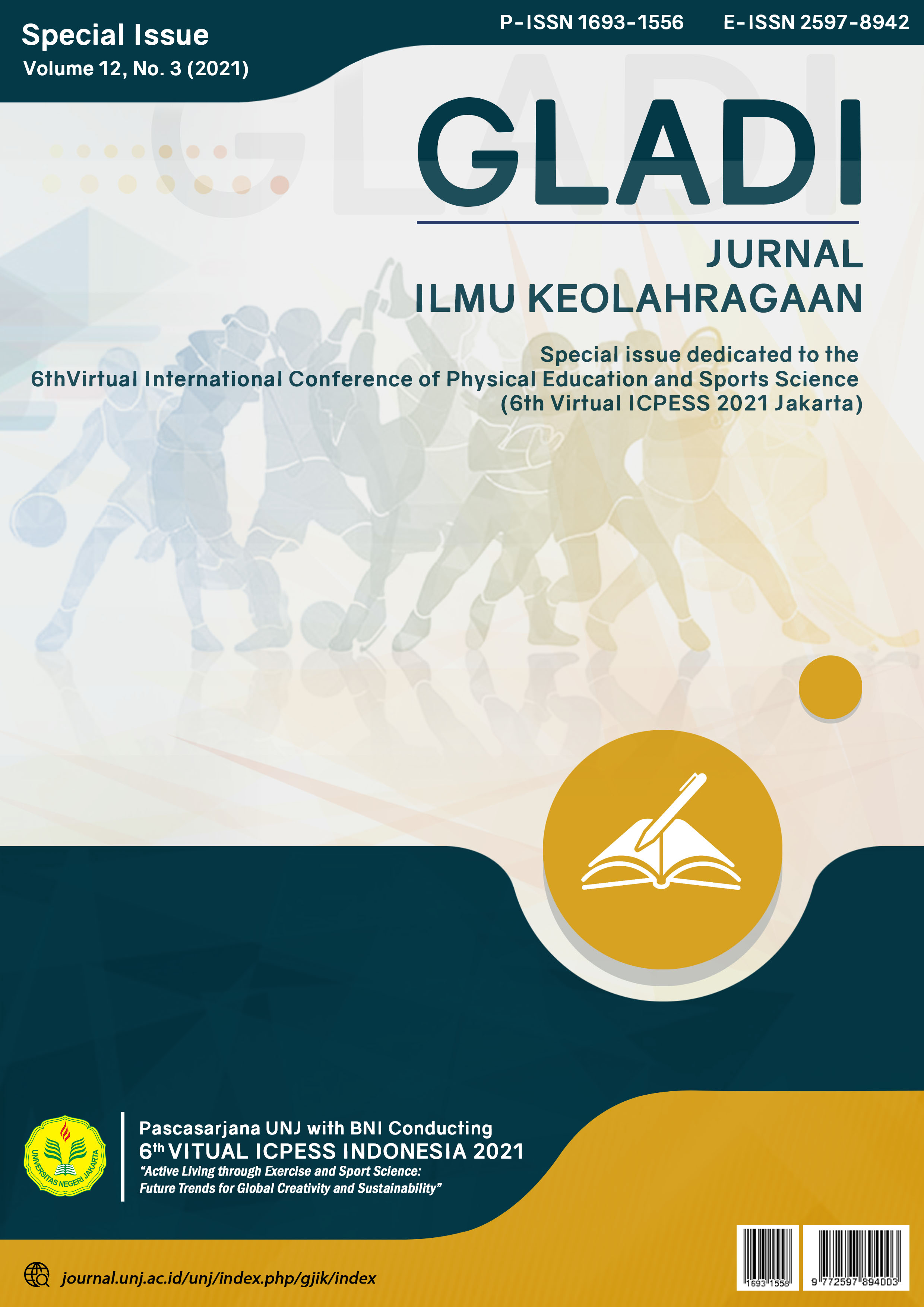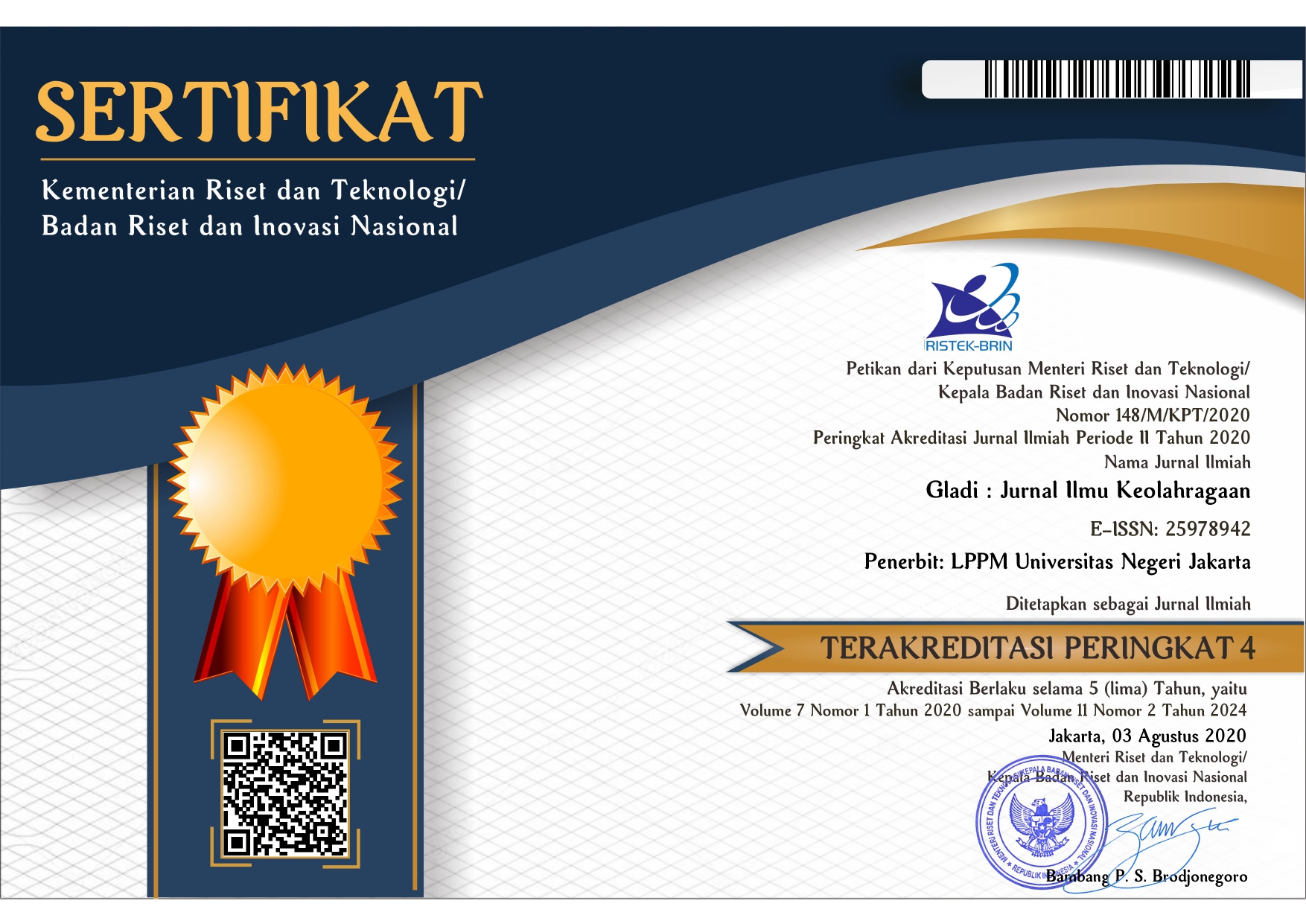Analysis Of Football Dribbling Skills
DOI:
https://doi.org/10.21009/GJIK.123.07Keywords:
Forms of Football Dribbling Mistakes, Elementary School Extracurricular StudentsAbstract
This research is motivated by the existence of various forms of soccer dribbling skill errors, namely first touch, coordination, and ball feeling as well as characteristic causes based on observations made by researchers, the facts in the field state that when the teacher delivers soccer dribbling material there are still many students who lack focus about understanding the strategy that the coach gives to students will have an impact on formations that cannot be applied during play. The next factor is that not many teachers/coaches apply various training models to the learning process, so it tends to be monotonous. The reason the author observes this problem is to find out, analyze and correct the form of football dribbling skills errors. The data collection method used in this research is a survey method with the locomotor skills test technique and the skill development phase test. The research sampling technique used a total sampling technique with a total of 40 responses from some class III and IV extracurricular students of Al-Fath BSD Elementary School, South Tangerang City. The research variables were basic first touch skills, coordination, and ball feeling in doing soccer dribbling. Analysis of research data using descriptive percentages. Based on the results of the assessment analysis, it can be concluded that the form of errors in the dribbling skills of the III and IV graders of football extracurricular is first touching 18%, coordination 45%, and ball feeling 15%. The cause of errors that occur in dribbling skills is a lack of coordination ability, this can be seen in the skill test percentage indicator after being analyzed.
Downloads
References
Anggraeni, D. ., & Saryono. (2013). Metodelogi Penelitian Kualitatif dan Kuantitatif Dalam Bidang Kesehatan. Nuha Medika.
Ariningsih, N., Sumarwati, S., & Saddhono, K. (2012). Analisis Kesalahan Berbahasa Indonesia Dalam Karangan Eksposisi Siswa Sekolah Menengah Atas. Jurnal Penelitian Bahasa, Sastra Indonesia, Dan Pengajarannya, 1(1), 130–141.
Asbari Masduki, Priyono Budi Santoso, A. P. (2019). PENGARUH KEPEMIMPINAN DAN BUDAYA ORGANISASI TERHADAP PERILAKU KERJA INOVATIF PADA INDRUSTRI 4.0. Jurnal Ilmiah Manajemen Universitas Putera Batam, 8(1), 7–15.
Danurwindo, Ganesha, P., Barry, S., & Prahara, J. L. (2017). Kurikulum Pembinaan Sepakbola Indonesia PSSI. 5.
Draganidis, D., Chatzinikolaou, A., Jamurtas, A. Z., Carlos Barbero, J., Tsoukas, D., Theodorou, A. S., Margonis, K., Michailidis, Y., Avloniti, A., Theodorou, A., Kambas, A., & Fatouros, I. (2013). The time-frame of acute resistance exercise effects on football skill performance: The impact of exercise intensity. Journal of Sports Sciences, 31(7), 714–722. https://doi.org/10.1080/02640414.2012.746725
Evan, B., Zask, A., Barnett, L., & Dietrich, U. C. (2002). Fundamental movement skills - How do primary school children perform? The “move it groove it” program in rural Australia. Journal of Science and Medicine in Sport, 5(3), 244–252. https://doi.org/10.1016/S1440-2440(02)80010-X
Giordano, L., Federici, A., Valentini, M., & D’elia, F. (2019). Dribbling in football: Confronting learning theories. Journal of Human Sport and Exercise, 14(Proc2), S228–S232. https://doi.org/10.14198/jhse.2019.14.Proc2.10
Hidayat, A. (2017). Peningkatan Aktivitas Gerak Lokomotor, Non Lokomotor dan Manipulatif Menggunakan Model Permainan Pada Siswa Sekolah Dasar. Jurnal Pendidikan Jasmani Dan Olahraga, 2(2), 21–29.
Hoare, D. (1994). Subtypes of developmental coordination disorder. Adapted Physical Activity Quarterly, 11(2), 158–169. https://doi.org/10.1123/apaq.11.2.158
Hopper, Crhistopher A.; Davis, M. S. (1988). Coaching Soccer Effectively. The American Coaching Effectiveness Program. Level 1 Soccer Book. In Coaching Soccer Effectively. The American Coaching Effectiveness Program. Level 1 Soccer Book. Human Kinetics Books.
Jayusman, I., & Shavab, O. A. K. (2020). Aktivitas Belajar Mahasiswa Dengan Menggunakan Media Pembelajaran Learning Management System (Lms) Berbasis Edmodo Dalam Pembelajaran Sejarah. Jurnal Artefak, 7(1), 13. https://doi.org/10.25157/ja.v7i1.3180
Putra, E. A. (2015). Anak Berkesulitan Belajar di Sekolah Dasar Se-Kelurahan Kalumbuk Padang. Jurnal Ilmiah Pendidikan Khusus, 1(3), 71–76. http://103.216.87.80/index.php/jupekhu/article/viewFile/6065/4707
Sidabutar, R. (2020). Survey Kualitas Pembelajaran di Masa Study From Home. 02(01), 24–29.
Smyth, M. M., & Anderson, H. I. (2001). Football participation in the primary school playground: The role of coordination impairments. British Journal of Developmental Psychology, 19(3), 369–379. https://doi.org/10.1348/026151001166155
Suherman, A. (2018). Kurikulum Pembelajaran Penjas (M. N. Alif (ed.); Kesatu).
Suherman, & Sari, R. E. (2019). Perancangan Aplikasi Pembuatan Formasi Sepak Bola Interaktif Dengan Macromedia Flash. Journal of Maritime and Education, 1(1), 1. http://ejournal.poltek-amimedan.ac.id/
Sultoni, Imam Gunawan, F. D. P. (2018). PERBEDAAN MOTIVASI BELAJAR MAHASISWA ANTARA SEBELUM DAN SESUDAH MENGIKUTI PELATIHAN MOTIVASIONAL. Jurnal Kajian Teori Dan Praktik Kependidikan, 3, 1. http://journal2.um.ac.id/index.php/jktpk
Taufik, M. S. (2019). MENINGKATKAN TEKNIK DASAR DRIBBLING SEPAKBOLA MELALUI MODIFIKASI PERMAINAN. Pendidikan Jasmani Kesehatan Dan Rekreasi, 8, 26–36.
Taufiqurriza, H. (2012). Tingkat Keterampilan Dasar Permainan Sepak Bola Pada Siswa Sekolah Dasar. Active - Journal of Physical Education, Sport, Health and Recreation, 1(1), 1–3. https://doi.org/10.15294/active.v1i1.266
Valentini, M., Riccardi, F., Raiola, G., & Federici, A. (2018). Educational research: Motor area and relational area during children’s personality development. Journal of Physical Education and Sport, 18(5), 2157–2174. https://doi.org/10.7752/jpes.2018.s5327
Viggita, D., & Arikunto, S. (2020). HUBUNGAN ANTARA MINAT BELAJAR DENGAN PRESTASI BELAJAR PADA SISWA KELAS X SMA NEGERI 1 KUTASARI DI PURBALINGGA. Doctoral Dissertation, Universitas Ahmad Dahlan, 1–7.
Weigelt, C., Williams, A. M., Wingrove, T., & Scott, M. A. (2000). Transfer and motor skill learning in association football. Ergonomics, 43(10), 1698–1707. https://doi.org/10.1080/001401300750004104







